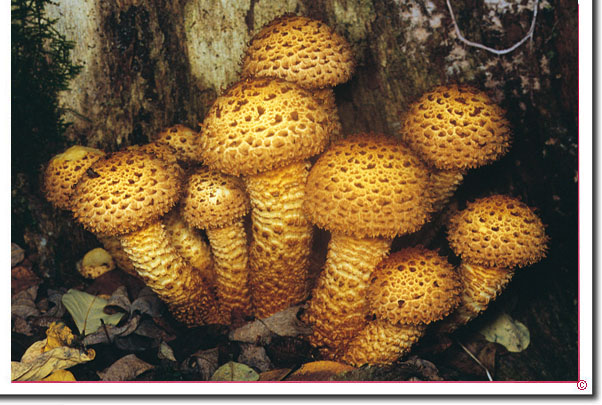einige Arten erst . parasitisch,
dann
. saprobiontisch .
andere Arten nur saprobiontisch
Sporenpulverfarbe
mittelbraun
Verwandtschaft:
Ständerpilze
. Basidiomycetes .
Blätterpilze
. Agaricales .
Träuschlingsverwandte
. Stropharicaceae .
In diesem Buch bisher vorgestellt:
Pholiota alnicola .
Zitronengelber Erlenschüppling
Pholiota aromatica .
Aromatischer Schüppling
Pholiota astragalina .
Safranroter Schüppling
Pholiota aurivella .
Goldfell-Schüppling
Pholiota flammans .
Feuer-Schüppling
Pholiota gummosa .
Gummi-Schüppling
Pholiota highlandensis .
Kohlen-Schüppling
Pholiota lenta .
Tonfalber Schüppling
Pholiota mutabilis .
Stockschwämmchen
Pholiota populnea .
Pappel-Schüppling
Pholiota spumosa .
Nadel-Schüppling
Pholiota squarrosa .
Sparriger Schüppling
Dies und das
zu Pholiota
bei Amazon
Schüpplinge - Pholiota

Typusart ist der Sparrige Schüppling Pholiota squarrosa. Foto: Fredi Kasparek
Pholiota (Fr.) P. Kumm., Führ. Pilzk. (Zwickau): 22, 83 (1871)
Nomenklatorischer Werdegang, chronologisch
Agaricus ser. Derminus Fr., Syst. mycol. (Lundae) 1: 10, 240 (1821)
Agaricus trib. Flammula Fr., Syst. mycol. (Lundae) 1: 11, 250 (1821)
Agaricus trib. Pholiota Fr., Syst. mycol. (Lundae) 1: 240 (1821)
Derminus (Fr.) Staude, Schwämme Mitteldeutschl.: xxvi, 86 (1857)
Flammula (Fr.) P. Kumm., Führ. Pilzk. (Zwickau): 22, 80 (1871)
Gymnocybe P. Karst., Bidr. Känn. Finl. Nat. Folk 32: 22, 412 (1879)
Dryophila Quél., Enchir. fung. (Paris): 66 (1886)
Flammopsis Fayod, Annls Sci. Nat., Bot., sér. 7 9: 356 (1889)
Ryssospora Fayod, Annls Sci. Nat., Bot., sér. 7 9: 361 (1889)
Hypodendrum Paulet ex Earle, Bulletin of the N.York Bot. Garden 5: 445 (1909)
Visculus Earle, Bulletin of the New York Botanical Garden 5: 437 (1909)
Nemecomyces Pilát, Annls mycol. 31(1/2): 54 (1933)
Kuehneromyces Singer & A.H. Sm., Mycologia 38(5): 504 (1946)
Pholiota subgen. Hemipholiota Singer, Sydowia 15(1-6): 70 (1962) [1961]
Hemipholiota (Singer) Bon, Docums Mycol. 17(no. 65): 52 (1986)
Phaeonematoloma (Singer) Bon, Z. Mykol. 60(1): 71 (1994)
Merkmale: Blätterpilze, die oft büschelig an Holz wachsen, mit gewölbtem, fleischigem Hut und zentralem Stiel, viele Arten mit mehr oder weniger gelben Farben. Hut schleimig oder trocken und dann oft schuppig, meistens mit Velum.
Sporenpulver lebhaft mittelbraun, Sporen meistens glatt, dickwandig, ellipsoidisch bis mandelförmig, i.D. blond, mit Keimporus oder ohne. Schnallen vorhanden. Cheilozystiden sackförmig-kopfig, Pleurozystiden oft als Chrysozystiden. Lebensweise parasitisch und saprophytisch.
Literaturauswahl
Bas, C., Kuyper, T.W., Noordeloos, M.E. & Vellinga, E.C. (eds.). 1999.
Flora agaricina neerlandica 4 - Rotterdam (80-105).
Bon, M. & Roux, P. 2003. Clé analytique de la famille Strophariaceae Singer & A.H. Smith - Doc. Mycol. 33 (129): 3-56 (30 - 42).
Gröger, F. 1991b. Hinweise zur Bestimmung von Schüpplingen (Pholiota) -
Myk. Mitt. bl. 34 (2): 49 - 57.
Jacobsson, S. 1989. Studies on Pholiota in culture - Mycotaxon 36(1): 95-145.
Jacobsson, S. 1990. Taxonomic studies in Pholiota (Basidiomycetes).
Dissertation, University of Göteborg, Sweden, 4 manuscripts (3 publ. 1986, 1987, 1989).
Jacobsson, S. 1991 [“1990“]. Pholiota in northern Europe - Windahlia 19: 1 - 86.
Ludwig, E. 2001. Pilzkompendium 1. Beschreibungen und Abbildungen.
IHW-Verlag, Eching, 758 pp, 188 pls (518-558 s.l., 721).
Smith, A.H. & Hesler, L.R. 1968. The North American species of Pholiota -
Hafner, New York, 402 pp.
Tjallingii-Beukers, D. 1987. De fungi van Nederland. Het geslacht Pholiota (Bundelzwammen) - Wetensch. Medel. K.N.N.V. 185: 1-75.